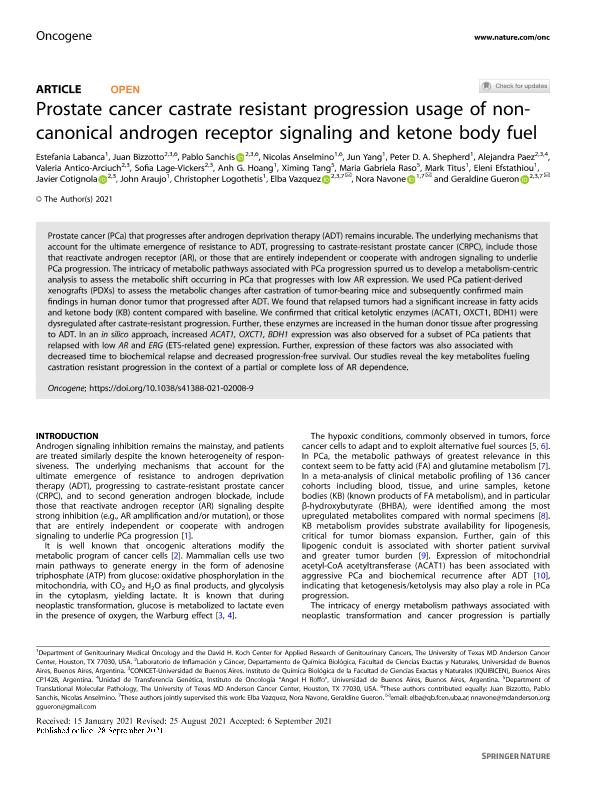Artículo
Prostate cancer castrate resistant progression usage of non-canonical androgen receptor signaling and ketone body fuel
Labanca, Estefania; Bizzotto, Juan Antonio ; Sanchis, Pablo Antonio
; Sanchis, Pablo Antonio ; Anselmino, Nicolás
; Anselmino, Nicolás ; Yang, Jun; Shepherd, Peter D. A.; Paez, Alejandra
; Yang, Jun; Shepherd, Peter D. A.; Paez, Alejandra ; Antico Arciuch, Valeria Gabriela
; Antico Arciuch, Valeria Gabriela ; Lage Vickers, Sofia
; Lage Vickers, Sofia ; Hoang, Anh G.; Tang, Ximing; Raso, Maria Gabriela; Titus, Mark; Efstathiou, Eleni; Cotignola, Javier Hernan
; Hoang, Anh G.; Tang, Ximing; Raso, Maria Gabriela; Titus, Mark; Efstathiou, Eleni; Cotignola, Javier Hernan ; Araujo, John; Logothetis, Christopher; Vazquez, Elba Susana
; Araujo, John; Logothetis, Christopher; Vazquez, Elba Susana ; Navone, Nora; Gueron, Geraldine
; Navone, Nora; Gueron, Geraldine
 ; Sanchis, Pablo Antonio
; Sanchis, Pablo Antonio ; Anselmino, Nicolás
; Anselmino, Nicolás ; Yang, Jun; Shepherd, Peter D. A.; Paez, Alejandra
; Yang, Jun; Shepherd, Peter D. A.; Paez, Alejandra ; Antico Arciuch, Valeria Gabriela
; Antico Arciuch, Valeria Gabriela ; Lage Vickers, Sofia
; Lage Vickers, Sofia ; Hoang, Anh G.; Tang, Ximing; Raso, Maria Gabriela; Titus, Mark; Efstathiou, Eleni; Cotignola, Javier Hernan
; Hoang, Anh G.; Tang, Ximing; Raso, Maria Gabriela; Titus, Mark; Efstathiou, Eleni; Cotignola, Javier Hernan ; Araujo, John; Logothetis, Christopher; Vazquez, Elba Susana
; Araujo, John; Logothetis, Christopher; Vazquez, Elba Susana ; Navone, Nora; Gueron, Geraldine
; Navone, Nora; Gueron, Geraldine
Fecha de publicación:
11/2021
Editorial:
Nature Publishing Group
Revista:
Oncogene
ISSN:
0950-9232
Idioma:
Inglés
Tipo de recurso:
Artículo publicado
Clasificación temática:
Resumen
Prostate cancer (PCa) that progresses after androgen deprivation therapy (ADT) remains incurable. The underlying mechanisms that account for the ultimate emergence of resistance to ADT, progressing to castrate-resistant prostate cancer (CRPC), include those that reactivate androgen receptor (AR), or those that are entirely independent or cooperate with androgen signaling to underlie PCa progression. The intricacy of metabolic pathways associated with PCa progression spurred us to develop a metabolism-centric analysis to assess the metabolic shift occurring in PCa that progresses with low AR expression. We used PCa patient-derived xenografts (PDXs) to assess the metabolic changes after castration of tumor-bearing mice and subsequently confirmed main findings in human donor tumor that progressed after ADT. We found that relapsed tumors had a significant increase in fatty acids and ketone body (KB) content compared with baseline. We confirmed that critical ketolytic enzymes (ACAT1, OXCT1, BDH1) were dysregulated after castrate-resistant progression. Further, these enzymes are increased in the human donor tissue after progressing to ADT. In an in silico approach, increased ACAT1, OXCT1, BDH1 expression was also observed for a subset of PCa patients that relapsed with low AR and ERG (ETS-related gene) expression. Further, expression of these factors was also associated with decreased time to biochemical relapse and decreased progression-free survival. Our studies reveal the key metabolites fueling castration resistant progression in the context of a partial or complete loss of AR dependence.
Palabras clave:
KETONE BODIES
,
PROSTATE CANCER
,
CRPC
,
METABOLOMICS
Archivos asociados
Licencia
Identificadores
Colecciones
Articulos(IQUIBICEN)
Articulos de INSTITUTO DE QUIMICA BIOLOGICA DE LA FACULTAD DE CS. EXACTAS Y NATURALES
Articulos de INSTITUTO DE QUIMICA BIOLOGICA DE LA FACULTAD DE CS. EXACTAS Y NATURALES
Citación
Labanca, Estefania; Bizzotto, Juan Antonio; Sanchis, Pablo Antonio; Anselmino, Nicolás; Yang, Jun; et al.; Prostate cancer castrate resistant progression usage of non-canonical androgen receptor signaling and ketone body fuel; Nature Publishing Group; Oncogene; 40; 44; 11-2021; 6284-6298
Compartir
Altmétricas



